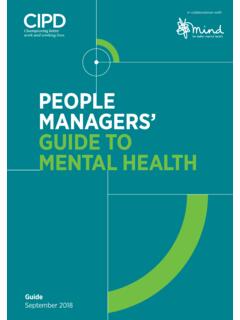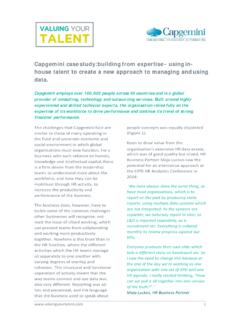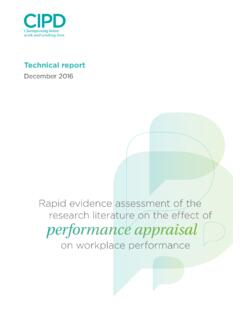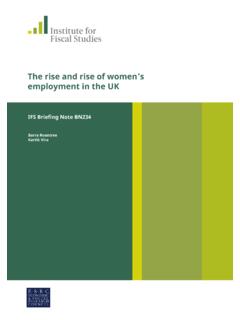Transcription of Employment regulation and the labour market - CIPD
1 Employment regulation and the labour market January 2015 Policy report1 Employment regulation and the labour marketThe CIPD is the professional body for HR and people development. The not-for-profit organisation champions better work and working lives and has been setting the benchmark for excellence in people and organisation development for more than 100 years. It has more than 135,000 members across the world, provides thought leadership through independent research on the world of work, and offers professional training and accreditation for those working in HR and learning and Employment regulation and the labour marketContentsAcknowledgements 2 Executive summary 3 Introduction 41 How the labour market is regulated 52 regulation and economic and labour market outcomes 7 Employment regulation and productivity 11 labour market outcomes 13 Young people 14
2 Job and Employment security 153 Employment protection and the quality of work 21 Low pay 25 Working time 25 Autonomy in the workplace 29 Conclusions 31 Endnotes 33 Employment regulation and the labour marketPolicy report2 Employment regulation and the labour market3 Employment regulation and the labour marketThis report was written by Ian Brinkley, chief economist at the Work Foundation.
3 The Work Foundation transforms people s experience of work and the labour market through high-quality applied research that empowers individuals and influences public policies and organisational its rigorous research programmes targeting organisations, cities, regions and economies, The Work Foundation is a leading provider of research-based analysis, knowledge exchange and policy advice in the UK and beyond. The Work Foundation is part of Lancaster Employment regulation and the labour marketWe find no overall advantage for most of the major OECD economies from weak or strong Employment protection legislation when looking at broad labour market measures some do better on some indicators, others worse.
4 The UK rarely shines, with many mid-table rankings. The Nordics and the Netherlands score consistently well. Some southern and eastern European economies could improve some labour market outcomes through greater UK scores badly in three specific areas productivity, low pay and integration of young people into the labour market . Productivity has been a long-standing weakness of the UK, and we have lost significant ground since 2008. The US, Germany, France and Italy all have much higher productivity than the UK and Canada, though productivity is lower in Japan. The UK s performance on low pay is also a major weakness, along with the US. Finally, young people fare especially badly in the UK in comparison with other G7 UK scores well against the EU28 on most workplace-related indicators when employees are asked about working conditions and various aspects of their job.
5 The idea that German, French and Italian workers are more content at work than their UK counterparts is not strongly supported by the evidence, despite the benefit of stronger legal rights and collective protections that the former enjoy. The quality of Employment in the UK is much better than is often we think this report is pointing to is that in the UK what actually happens in the workplace (what we term practice ) matters much more for the quality and efficiency of work than legislation setting down Employment rights. In our view, the UK is very unlikely to get much benefit from either further deregulation or significant re- regulation . Limited legislation may be needed to correct abuses in particular areas and to resolve some of the confusion around the relative status of employees, workers and the self-employed.
6 There must be renewed emphasis on enforcing and improving awareness of existing Employment rights among employers and main focus instead must be on enhancing whatever strengthens good workplace practice, while addressing specific weakness especially on young people and low pay with a range of complementary and appropriate economic, industrial and labour market policies. The UK has a number of important labour market institutions that are all developing a more strategic approach to the labour market . The Department for Business, Innovation and Skills (BIS) should help bring together key labour market social partner institutions (for example UKCES, Acas, LPC, CBI, TUC) with other independent expert bodies to form a hub for expert policy advice on the workplace.
7 The CIPD has suggested the creation of a Workplace Commission for this purpose to co-ordinate policy-making across government departments and relevant agencies on workplace issues and to engage those bodies with the expertise and leverage to improve practice in organisations. Its primary purpose would be to develop and drive forward a government-supported, sector-based and workplace-focused campaign on productivity, performance and good summary The idea that German, French and Italian workers are more content at work than their UK counterparts is not strongly supported by the evidence, despite the benefit of stronger legal rights and collective protections that the former enjoy.
8 4 Employment regulation and the labour market5 Employment regulation and the labour marketIntroductionThe purpose of this report is to provide a balanced perspective on how modern labour markets are regulated and the associations between the degree of regulation and what impact that has on labour market and workplace outcomes. We explore whether or not there are strong associations between more liberal and more restrictive Employment protection policies and macro-economic outcomes (productivity and Employment ) and workplace outcomes (employee perceptions of workplace conditions and job quality). The public debate can often appear polarised between those who argue that the UK suffers from a lack of regulation , especially around protections at work, which encourages poor treatment, high levels of insecurity and widespread low pay.
9 The Trades Union Congress (TUC), for example, has argued for stronger protections in some areas and also for measures to support wider collective bargaining. Employer organisations have expressed concern at increasing regulatory burdens on business and reducing flexibility, especially at a time of economic crisis across much of the OECD and intensifying competitive pressure from the emerging reality, the debate is often less polarised than might be assumed, especially when we move away from a narrow focus on Employment protection. For example, there is widespread industrial and cross-political party support for the National Minimum Wage, which would have been unthinkable in the mid-1990s.
10 Organisations representing labour and capital still have their differences, but few voices on either side are calling for either a major rolling-back of the regulatory reforms made since 1980, or for a major new push towards a completely deregulated labour market . A recent CBI report1 notes that cohesive societies .. help create stable political and regulatory environments in which firms can do business. And while the CBI opposes further regulation in areas such as zero-hours contracts, the report does not propose further radical positions have nonetheless been taken by some who argue that the UK could extract significant further advantage from further limits on Employment rights and constraints on industrial action.














